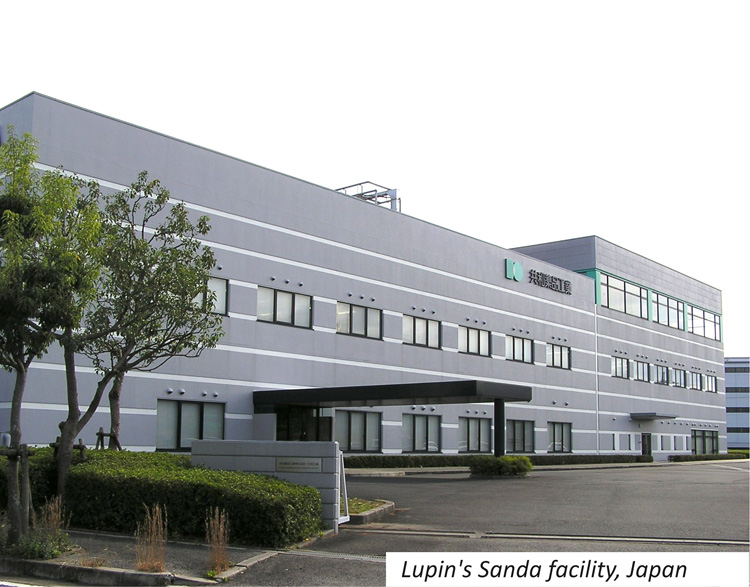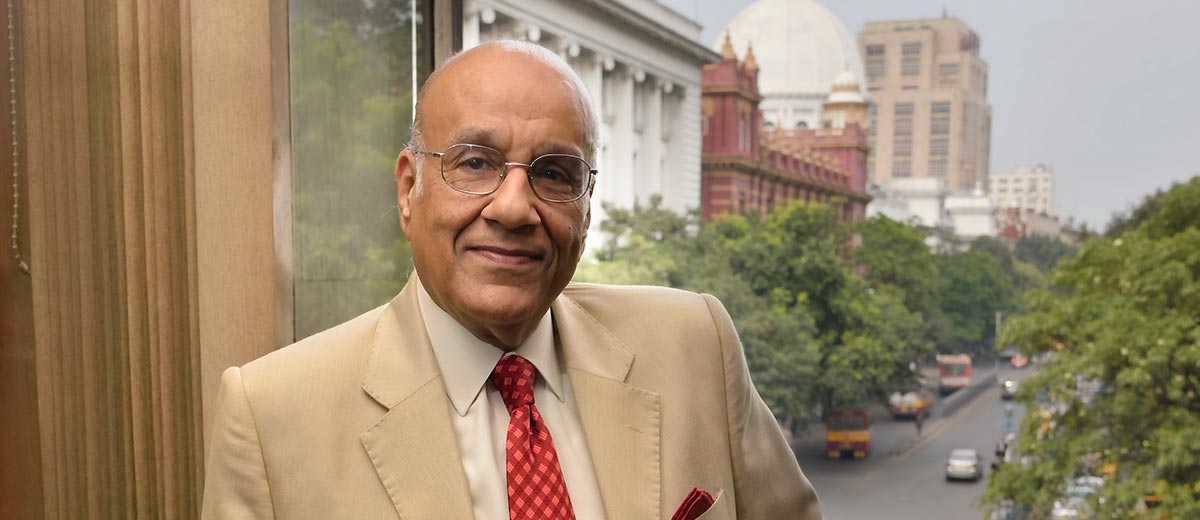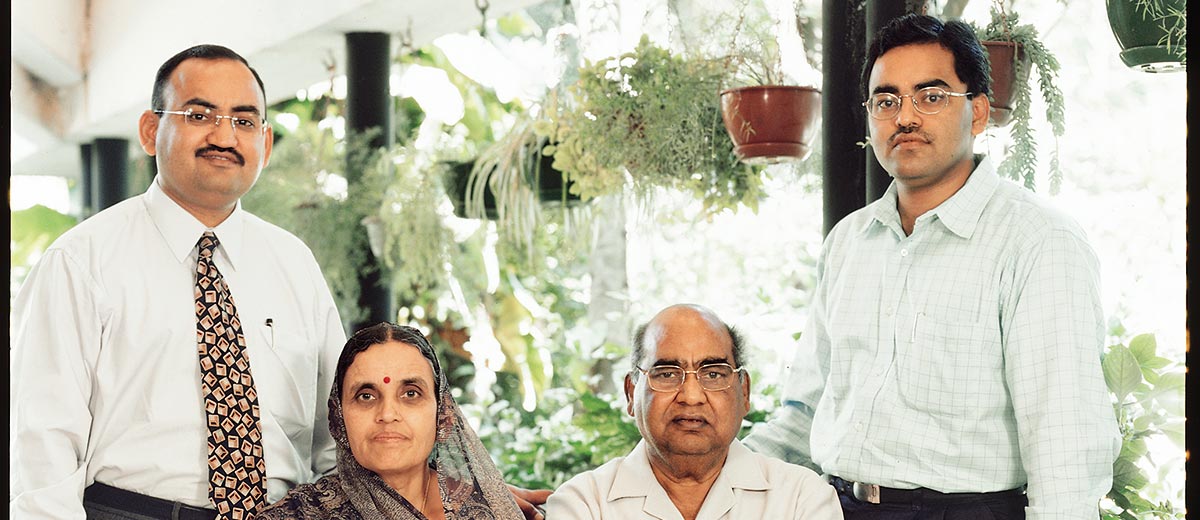
Dr Desh Bandhu Gupta: Self-made billionaire
 Dr Desh Bandhu Gupta, founder of Lupin Limited, ranks #14 among India’s richest. However, rankings don’t mean much to Dr Gupta, who, now 78, believes in the ‘dharma of karma’ and is ever ready to take up new projects and social causes that come his way. MARWAR talks to the deeply spiritual man, who started his business with just Rs 5,000.
Dr Desh Bandhu Gupta, founder of Lupin Limited, ranks #14 among India’s richest. However, rankings don’t mean much to Dr Gupta, who, now 78, believes in the ‘dharma of karma’ and is ever ready to take up new projects and social causes that come his way. MARWAR talks to the deeply spiritual man, who started his business with just Rs 5,000.
“I am ready [for the interview],” announces Dr Desh Bandhu Gupta as he enters his office. Coming from Dr Gupta, a man who has never shied away from challenges, the words couldn’t have rung more true. Now 78, the founder and chairman of the US 2.6 billion dollar generics firm Lupin Limited, is still as ready to make a change in people’s lives as he was when he launched Lupin in 1968. We met the septuagenarian at his office in BKC, Mumbai, to discuss his work, family, his philanthropic activities and his dream-turned-reality, Lupin Limited.
 A firm grounding
A firm grounding
Born to a family of teachers, Dr Gupta grew up in a close-knit family in Rajgarh, near Bharatpur in Rajasthan. “My father was a schoolteacher and a disciplinarian and we [four younger brothers and a sister] grew up with strict values. He always wanted me to come first in my class, there was no room for being second best,” says Dr Gupta.
Thankfully, the preparation he received as a child stood him in good stead later in life. He went on to earn a Master of Science degree (Chemistry) when he was just 20. “I remember the government approved my application even though I did not meet the age requirement. I was also later awarded an honorary Doctor of Science (DSc) degree,” he shares.
Although his father wanted him to teach agriculture, Dr Gupta harboured an ambition to become a teacher at the Birla Institute of Technology and Science (BITS), Pilani. “I applied and was accepted, but found that there was a lot of gap between what I was teaching as an associate professor of chemistry and its application in reality. India then was a young nation and needed building; that prompted me to apply for a direct commission in the Indian Army as a resident teacher of chemical engineering.”
Destiny, however, had other plans for him. Even though Dr Gupta cleared the initial round, he was rejected during the medical test, owing to an ankle fracture he had suffered when he was 14. It was then that he realised his true calling: “to start something that would make a real difference to people around”.
 Launching Lupin Limited
Launching Lupin Limited
Dr Gupta moved to Mumbai [then Bombay] with his wife in the early ’60s, where he worked for a few years in a British pharmaceutical company called May & Baker. But, his belief that science could change the way people lived wouldn’t let him rest easy. “Armed with my conviction and everything I had learned and imbibed as a teacher and a student, I decided to begin my own business,” he says.
He started by borrowing R5,000 from his wife and paid R1,000 to acquire the name Lupin as he wanted to revive it. Dr Gupta explains why the name found resonance with his beliefs: “The lupin flower is known to nourish the land, the very soil it grows in. It is also known to be tolerant of infertile soil and capable of pioneering change in barren and poor climes. The flower and bean pods have long been used as sources of nourishment, thus protecting and nurturing life.”
“This was in 1968 and I haven’t looked back since,” he continues. “It was an exciting and challenging time when I began; we were one and a half employees strong—a peon-cum-packer and a part-time typist. That was Lupin then, and here we are [today] the Lupin of 2016— a USD 2.06 billion innovation-led pharmaceutical company with medicines reaching over 100 countries,” says Dr Gupta.
 Challenges faced
Challenges faced
The initial years were full of struggle as financing a new business in those days was difficult and venture capital funds and private equity were unheard of. In the initial years, around the early seventies, nationalisation of large Indian banks was effected, which gave Lupin a new lease of life and access to capital. Dr Gupta, the visionary that he is, grasped the opportunity with open arms. He met a number of bankers and shared with them his business ideas and was fortunate to find supportive people. “This gave me the initial principal needed to set up a small office and plant, buy requisite material, [acquire] manpower and get Lupin going,” he says.
The second challenge Dr Gupta faced was the regulatory regime that was prevalent at the time. It forbade companies to market any product that was not first approved by regulatory bodies. And getting approvals was a mammoth task. Dr Gupta travelled frequently to New Delhi and managed to win approvals from the Health Ministry for four to five products, which became Lupin’s first official launches. Back then, Lupin’s main focus was on areas such as women’s health, nutrients and basic anti-infectives. The business started off under a ‘loan licence’ model, where the products were manufactured by another company and Lupin licensed them and then got them approved by the state FDA.
Fighting tuberculosis
Given Lupin’s vision of fighting life-threatening diseases and manufacturing drugs that were of the highest social priority, tuberculosis (TB) was one of the diseases that
Dr Gupta chose to combat. “Most big pharma companies were not interested in TB drugs because it was, and still remains, a low-profit business,” he says.
Today, India accounts for one-fifth of the global TB cases (going by World Health Organization India reports) and TB is a major public health problem in the country. Also, according to World Health Organization (WHO) estimates, some three lakh people die from TB each year in India. Further, almost 24 per cent of the world’s missed TB cases are from India, and 50 per cent of detected cases go unreported in the National TB Program (NTP).
“Even today, in spite of these alarming numbers, not much is being done in terms of developing new medicines for combating TB globally,” rues Dr Gupta. Lupin has, however, focused on anti-TB medicines over the decades, and is a global leader in anti-TB drugs even today, although it accounts for less than 10 per cent of the company’s global revenues. Lupin enjoys close to 50 per cent market share of the overall anti-TB market in India. It supplies anti-TB drugs to government and international agencies and to the Revised National Tuberculosis Control Programme. It also launched a joint anti-TB campaign along with the Rotary Club of Mumbai last year to create awareness, detect and combat TB in Mumbai.
Expansion and acquisition
In the beginning, most of Lupin’s competitors were large MNCs supplying drugs at exorbitant prices that the common man couldn’t afford. Indian pharmaceutical companies weren’t operational in a large way and there were just a handful of them. Recalling those days, Dr Gupta says, “We started off small… later, I started expanding Lupin by getting into manufacturing and developing of APIs and Intermediates and setting up manufacturing plants in Aurangabad, Ankleshwar, Mandideep and Tarapur.”
After TB medicines, Lupin ventured into cephalosporins and cardiovasculars. The focus was to create products that were required, high on quality, cost-effective and in keeping with regulatory standards. “Once we had built our strengths in APIs, our progression into formulations was but natural. We were ready to go global, but needed to ramp up our investments in research to create a meaningful pipeline for key markets. I knew we had to create differentiated products in order to sustain,” Dr Gupta explains.
The sprawling Lupin Research Park in Pune, which was commissioned in 2000, became the global hub for all of Lupin’s research programmes, be it generics or process research, or delivery systems and new drug discovery and development. The company focused on differentiated products built around its strengths in cephalosporins and cardiovascular segments. It also did things differently. Lupin did not enter the American market through the generics route. Instead, the company forayed into the US with the launch of a brand, Suprax.
Lupin was the first to enter the Japanese market in 2007 (through its Kyowa acquisition) and today it is the only Indian company with a meaningful business in Japan. “The markets rewarded us for the approach we took when it came to research, technology, products or the markets we chose to expand into, and Lupin today has the fifth largest generic pipeline pending approval with the US FDA,” Dr Gupta says. The first phase of acquisition took place from 2007-2009, when Lupin acquired Kyowa in Japan, Novodigm in India, Generic Health in Australia, Hormosan in Germany, Pharma Dynamics in South Africa and Multicare in the Philippines. In addition to a strong internal effort, all of these added to Lupin’s growth from FY 2010 to FY 2015, as Lupin emerged as USD 2.06 billion pharma major.
Lupin then stepped up its mergers and acquisitions activity to enter valuable markets and differentiated and highly niche segments such as complex injectables and ophthalmics. It acquired Nanomi in the Netherlands, Laboratorios Grin in Mexico, Medquímica in Brazil, Gavis in the US and Temmler Pharma’s speciality product portfolio in Germany. The Gavis acquisition, valued at USD 880 million, has enhanced Lupin’s scale in the US generic market and broadened the company’s pipeline in dermatology and controlled substance products.
The acquisition gave Lupin manufacturing capabilities in the US, along with a highly skilled US-based
R & D organisation, which complemented its Coral Springs, Florida, Inhalation R & D centre. “We acquire companies that help us enter new markets, or expand our presence in existing markets; add to our existing product portfolio, or help us add therapies to our business mix that we feel are missing from our portfolio. We also acquire to add technology and research competencies,” Dr Gupta explains.
“We foresee tremendous growth for Lupin given our strong marketing and sales capabilities, an enviable market mix, a quality product pipeline, delivered by 24/7 world-class manufacturing and supply chain operations. We are also poised to achieve our intended target of USD 5 billion in revenues by 2018-19,” he adds.
More than just profit
One motivating factor in Dr Gupta’s life has been to give back to society, for which he set up the Lupin Human Welfare & Research Foundation (LHWRF) in 1988. The LHWRF was set up to create a replicable and ever-evolving model for sustainable rural development, with the goal of uplifting families living below the poverty line. It is now one of the largest NGOs and social development initiatives undertaken by a corporate in South-East Asia, touching the lives of over 2.5 million people and covering 3,463 villages spread across Rajasthan, Madhya Pradesh, Maharashtra, Uttarakhand, Gujarat, Jammu & Kashmir and Goa.
“From the time one is born, one keeps taking from society, from parents, family, institutions and the environment. Isn’t it natural that one should give back, specially when one is in a position to do so?” Dr Gupta contends. “Of what use is scientific knowledge, technology development and economic progress if they can’t be used to restore a marginalised individual or family’s lost confidence, or extend the benefits of modern education to the underprivileged and transform lives?” he argues.
Dr Gupta has been instrumental in setting up the Deshbandhu & Manju Gupta Foundation, where he has earmarked over R100 crore of his wealth for creation of programmes that would help alleviate poverty and empower rural communities. The aim is to empower individuals and families living below poverty line and ensure that benefits of education and growth reach them, so that they can ink a new destiny for themselves.
A spiritual man
To Dr Gupta, material success and business achievements are but mere milestones and not something that matter in the larger scheme of things. A deeply spiritual man, he lays more emphasis on the ‘dharma of karma’. “I believe spirituality unites us and is much deeper than our religious affiliations. I believe in positive intent and that happiness must be amalgamated internally,” says Dr Gupta, who is a trustee of the Global Vipassana Foundation and also the chairman of the managing committee of ISKCON.
“ISKCON is very close to my heart since I learned the Bhagavad Gita from my father when I was only 12. It encompasses all of life’s subjects, thus being relevant to everyday life, and everyday decision making. Vipassana brings complete unity within oneself. It helped my ankle injury and my wife’s spondylitis,” Dr Gupta says.
Dr Gupta was bestowed with the Lifetime Achievement Award during the Pharma Leadership Summit of 2009 and the Ernst and Young Entrepreneur of the Year 2011–Visionary Leader award. These awards, to him, are recognition of his hard work and contribution to society, but more importantly, a reminder to keep embarking on greater missions.
Taking the legacy forward
Dr Gupta likes to call himself a complete family man. Married to Manju Gupta for almost five decades and blessed with five children, he says, “Manju has been my source of strength; we have five children, all of whom I am very proud of. I am happy that Manju and I were able to inculcate the values in them that we grew up with. I am proud that they are extremely well-qualified and independent professionals in their own right.” Anuja and Richa are both doctors, married and settled in the US and associated with the healthcare system, while Kavita, who is married and settled in Bengaluru, runs her own chain of schools. Vinita and Nilesh have been in Lupin for over two decades and have worked their way through the company. “Both Vinita, the CEO, and Nilesh, the managing director, have grown and earned their spurs within the company. There was a complete segregation between ownership and management, with them being at the receiving end of extra scrutiny. They jokingly used to ask me if they were being penalised for being my children,” Dr Gupta laughs.
Vinita has not only been responsible for setting up Lupin in the US and Europe but has also been instrumental in formulating and executing strategies that helped Lupin emerge as a global generics powerhouse and an emerging speciality pharmaceutical player. It is Vinita’s business strategy and execution that has taken Lupin’s turnover in the US to close to a billion dollars in just 10 years. Nilesh has been instrumental in building, strengthening and directing Lupin’s research programmes. He has been instrumental in the creation of a meaningful product pipeline for markets such as the US, Europe and Japan, as well as for building quality driven technical operations—a network of over 14 global manufacturing facilities supported by a nimble supply chain. He is also responsible for Lupin’s businesses in Asia Pacific, including key markets such as India and Japan. These businesses contribute close to 35 per cent of Lupin’s global revenues.
The Marwari background
Lupin has become a multibillion dollar enterprise within a matter of decades. Dr Gupta credits this phenomenal achievement to his constant desire to deliver socially relevant products and services and his Marwari business background. “Marwaris have traditionally excelled in trading and commodity-based businesses, but with Lupin, we can concur that we are capable of making waves in any business that involves knowledge and IPR, be it pharma or biotech or in IT,” he says.
Also, he has always believed that companies founded with a strong vision and built on solid values are the ones that thrive—because they make their customers and society the reason for their existence. “At Lupin, we have created a culture of growth, of creative optimism, of caring for people and our communities. This Lupin spirit has helped us innovate and deliver strong performances consistently,” he says.
Counting achievements
Dr Gupta measures his achievements not in monetary terms but regards his family, which includes 15,000+ Lupinites, as his real blessings. “My family, my children and grandchildren are my source of joy. During a holiday to Scotland a few years back, my children surprised me by describing me in loving words. They said I have been a doting father, a visionary, a motivator, a figure larger than life; and I was at a loss for words. It meant so much to me,” says Dr Gupta with a smile.
Dr Gupta continues to practise yoga and meditation and studies philosophy regularly. On days when he feels up to it, he goes for a walk or for a swim. When he isn’t working, he spends time with his grandchildren. “Thankfully, I have a small army of six who are such a pleasure and a handful. They keep me fit and younger,” Dr Gupta smiles.
His greatest achievement, he feels, has been to turn the vision he calls ‘Lupin’ into reality—a business that is value-based and a business that shall always remain relevant to the stakeholders and communities it has sought to serve. “I have learnt that everyone has inherent qualities, and if one is able to concentrate on that, repose faith and infuse confidence in them; direct them to paint a picture; marry them to a larger cause; help them dream, give them wings and trigger their imagination; then mountains can be moved. And that is the secret behind Lupin and everything I have ever done,” he says.









1 Comment
[…] Read More […]